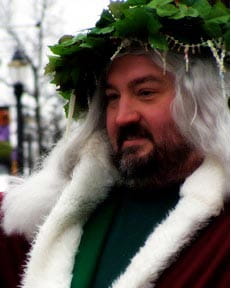By Mark D. Roberts
 When we last left Ebenezer Scrooge he had just finished being visited by the first of three Christmas spirits, the Ghost of Christmas Past. He fell into bed, exhausted. At the beginning of Stave 3, Scrooge awakes, ready for the visit of the next of the three spirits. This visitor is the Ghost of Christmas Present, a giant being who exudes the extravagant joy of Christmas. Though at first hesitant to look at this spirit, soon Scrooge shows how his heart has begun to change:
When we last left Ebenezer Scrooge he had just finished being visited by the first of three Christmas spirits, the Ghost of Christmas Past. He fell into bed, exhausted. At the beginning of Stave 3, Scrooge awakes, ready for the visit of the next of the three spirits. This visitor is the Ghost of Christmas Present, a giant being who exudes the extravagant joy of Christmas. Though at first hesitant to look at this spirit, soon Scrooge shows how his heart has begun to change:
"Spirit," said Scrooge submissively, "conduct me where you will. I went forth last night on compulsion, and I learnt a lesson which is working now. To-night, if you have aught to teach me, let me profit by it."
Like his predecessor, the Ghost of Christmas Present shows Ebenezer Scrooge many scenes of Christmas. Here Dickens is at his "Dickensiest" in lavish descriptions of food and festivity, all of which accentuate the joyfulness of Christmas. At first an observer of such delights, in time Scrooge begins to participate in the Christmas games as if he were actually present in the celebrations. He does this most of all as he watches the Christmas celebration of his nephew, Fred, who, in spite of having been mistreated by his uncle the day before, nevertheless wishes Scrooge a Merry Christmas.
What has turned Scrooge into a man who delights in Christmas parties? His observation of genuine celebration leads, it seems, to an openhearted desire to become an enthusiastic celebrator. Dickens believes that festivity, especially of the pure-hearted variety, is contagious. Yet what touches Scrooge's heart in Stave 3 isn't merely his looking upon numerous Christmas parties. One scene in particular has special impact upon his soul.
It comes as he observes the family of his Clerk, Bob Cratchit. Though this family has little in the way of money, they abound in love and joy. The center of their passion is Tiny Tim, the Cratchits' sickly little boy, who walked with a crutch and was supported by "an iron frame." This sweet boy had may have had a crippled body. But his heart is bigger and stronger than most. He's the one, after all, who offers the generous wish: "God bless us every one!" Viewing Tiny Tim in his weakened state, Scrooge asks the spirit "if Tiny Tim will live."
"If these shadows remain unaltered by the Future," the Spirit responds, "the child will die."
"No, no," said Scrooge. "Oh no, kind Spirit! say he will be spared."
To which the Spirit quotes Scrooges own words from Stave 1: "If he be like to die, he had better do it, and decrease the surplus population." Confronted in this way, "Scrooge hung his head to hear his own words quoted by the Spirit, and was overcome with penitence and grief."
Precisely at this point in the story, Bob Cratchit offers a toast to Mr. Scrooge, "the Founder of the Feast." Even though his family is none too happy to drink to Mr. Scrooge, they dutifully follow their father's lead. Thus compacted into a minute's worth of action, Scrooge feels compassion for Tiny Tim, learns that he will die unless something unexpected happens, is confronted by his former hard-heartedness, repents profoundly, and then witnesses the extraordinary grace of his mistreated clerk, Bob Cratchit. Now that's a formula for personal transformation!
Dickens uses Tiny Tim, perhaps more than any other character, to pry open the icy heart of Ebenezer Scrooge. This reflects Dickens's own experience of being touched by children, especially their suffering. I noted earlier that the first sign of tenderness in Scrooge comes as he observes his own childhood loneliness. This prepares him to be compassionate for other children. Dickens once wrote to a friend, "Certainly there is nothing more touching than the suffering of a child, nothing more overwhelming" (Annotated Christmas Carol, p. 97).
This conviction no doubt explains the bizarre conclusion to Stave 3. As the Ghost of Christmas Present nears the end of his mission to save Scrooge, he reveals two children hiding beneath his robe. They are "wretched, abject, frightful, hideous, miserable." Who are these emaciated beings? "This boy is Ignorance. This girl is Want."
Their presence calls forth compassion from Scrooge, who asks, "Have they no refuge or resource?"
Once again the spirit hurls Scrooge's own words back in his face: "Are there no prisons? Are there no workhouses?" And with this, the Ghost of Christmas Past disappears along with his pitiful children.
So what in Stave 3 contributes to the transformation of Scrooge's heart? I'll answer this question in my next post, and add some pastoral reflections.




